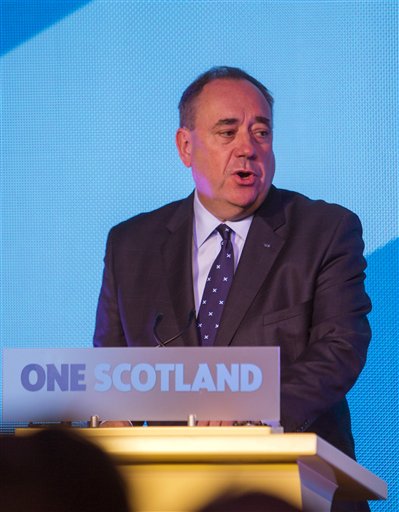READ MORELeaving the kingdom? Locals supportive, critical of Thursday vote for Scottish independence
EDINBURGH, Scotland - Scotland's pro-independence leader Alex Salmond announced Friday that he will resign as first minister and leader of his political party, hours after Scots voted to remain in the United Kingdom.
Salmond, 59, told reporters at a news conference that he was proud of the campaign and the record turnout for Thursday's referendum.
"For Scotland the campaign is not over and the dream will never die," he said.
Salmond's impassioned plea to launch a new nation fell short, with Scots choosing instead the security of remaining in union with England, Wales and Northern Ireland.
The referendum's result prevented a rupture of a 307-year union with England, bringing a huge sigh of relief to Britain's economic and political establishment.
In the referendum, 55 percent were against independence to 45 percent in favor. There was an unprecedented turnout of just under 85 percent.
A visibly relieved British Prime Minister David Cameron promised to live up to earlier promises to give Scotland new powers on taxes, spending and welfare. Cameron told reporters outside his Downing Street office that the new plans will be agreed upon by November, with draft legislation by January.
Salmond, even in announcing his resignation as Scottish leader and as the head of the Scottish National Party, was upbeat about Scotland's future.
"We now have the opportunity to hold Westminster's feet to the fire on the vow that they have made to devolve further meaningful power to Scotland," he said. "This places Scotland in a very strong position.
As Scotland's fledgling first minister in 2007, Salmond made a referendum on independence his grand strategic goal and predicted, to general disbelief even from supporters, it would be won within a decade.
But it wasn't to be.
"We have chosen unity over division," Alistair Darling, head of the No campaign, said earlier in Glasgow. "Today is a momentous day for Scotland and the United Kingdom as a whole."
The vote riveted the world. In Washington, President Barack Obama welcomed Scotland's choice, and congratulated Scots for their "full and energetic exercise of democracy."
"Harry Potter" author J.K. Rowling, who had given 1 million pounds ($1.6 million) to the No campaign, said she followed the returns overnight.
"Been up all night watching Scotland make history," she tweeted. "A huge turnout, a peaceful democratic process: we should be proud."
The No campaign won the capital city, Edinburgh, by a margin of 61 percent to 38 percent and triumphed by 59 percent to 41 percent in Aberdeen, the country's oil center. The Yes campaign won Glasgow, Scotland's biggest city, but it was not enough.
As dawn broke to lead-gray skies over Glasgow, the dream of independence that had seemed so tantalizingly close evaporated in the soft drizzle.
Salmond said he would serve until a new leader is elected in November, and that afterward he will continue to serve as a lawmaker in the Scottish Parliament.
"It has been the privilege of my life to serve Scotland as first minister," he said. "But as I said often during the referendum campaign this is not about me or the SNP.
"We lost the referendum vote, but can still carry the political initiative. More importantly Scotland can still emerge as the real winner."

